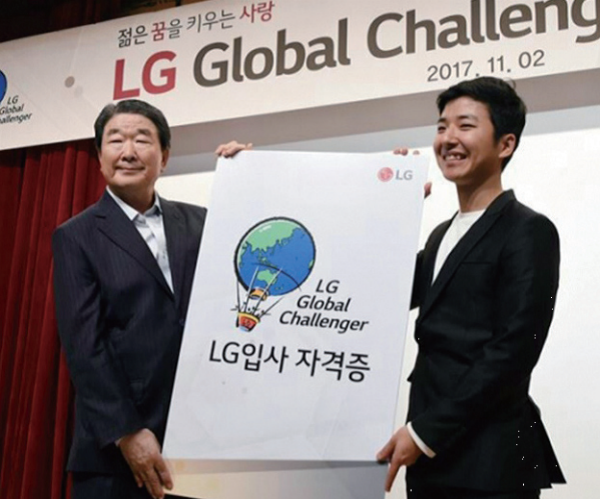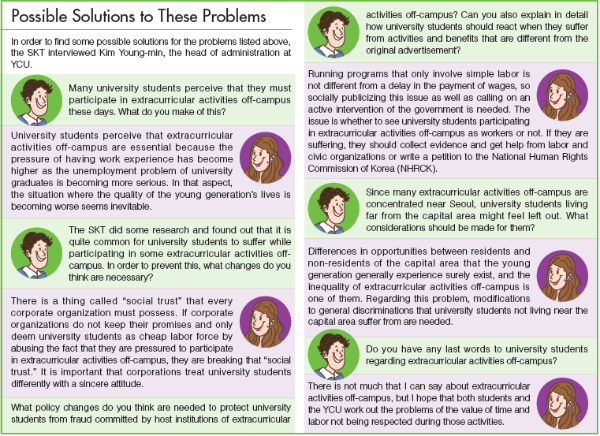Although university students have their hands full with completing homework assignments and working part-time, some of them are sparing extra time for something else: extracurricular activities off-campus. For the past few years, extracurricular activities off-campus have become essential for employment along with licenses and internships. According to a questionnaire survey conducted by the Daehak Naeil 20s Research Center on 930 university students in 2017, 70.5% of the respondents replied that they had applied for extracurricular activities off-campus at least once, and nearly half of the students (55.8%) replied that they had participated in extracurricular activities off-campus at least once. Many students benefit from doing extracurricular activities off-campus, but some of them are found to be discouraged by these activities at the same time. Thus, the Sungkyun Times (SKT) first introduces what extracurricular activities off-campus are, explores what problems exist regarding these activities, and discusses possible improvements that can be made through an interview with the Youth Community Union (YCU).
Extracurricular Activities Off-Campus
What is an extracurricular activity “off-campus”?
Although most Kingos will probably know what extracurricular activities are, they may not be familiar with extracurricular activities “off-campus.” As the term itself implies, extracurricular activities “off-campus” refer to activities that university students do outside the campus with the support of corporations (in most cases). These activities include national and international volunteer programs, press corps, supporters programs, and online and offline contests. The duration of these activities varies from one month to one year, and large enterprises are not the only hosts that organize these activities. Small and medium-sized enterprises, the government, and public institutions also host these activities.
The demand for extracurricular activities off-campus is steadily increasing, and these activities have now become an important experience that cannot be left out of the campus life of university students in Korea. According to the Daehak Naeil 20s Research Center, the participation rate of extracurricular activities has increased from 44.8% in 2015 to 55.8% in 2017. The participation in online and offline contests also increased from 22.6% to 37.1% during the same periods. Due to these trends, it is extremely difficult for students to participate in well-known extracurricular activities off-campus; therefore, proper preparations for an interview and a resume are needed in order to participate in these activities. According to a questionnaire survey conducted in 2017 by Campus Job & Joy, a magazine specializing in researching university students, the “CGV University Students Marketing Panel T.O.C (Tomorrow of CGV)”, which was selected as the number one extracurricular activity off-campus for marketing, had a competition rate of about 54: 1 last year. Considering the average employment competition rate for large corporations in 2017, which was approximately 35.7: 1, college students’ demand for extracurricular activities off-campus is extremely high. Recently, the number of students interested in public institutions has been increasing, and this preference is reflected in the preference for extracurricular activities as well. When asked which host institutions they prefer the most for extracurricular activities, 38.4% of the university students chose the government and public institutions, 35.6% large corporations, and 9.6% small and medium-sized enterprises.
Benefits of Extracurricular Activities Off-Campus
There are many benefits that extracurricular activities off-campus provide. First of all, extracurricular activities off-campus provide an opportunity to interact with a variety of different people. These activities allow university students to build a strong network by interacting with peer groups from all over the country. In addition to this, they also provide university students with opportunities to have a meeting with employees of enterprises and public institutions who are difficult to meet in normal circumstances. By interacting with those people and improving business experience, students can strengthen their competence. For example, the “LG CNS Press Corps” program provides its participants with opportunities to interview actual employees and take special lectures, which will all together enhance students’ abilities.
Not only that, extracurricular activities off-campus also provide financial benefits and opportunities for traveling abroad. Host institutions of extracurricular activities off-campus finance activity costs and award the contest winners a significantly large amount of money—from the perspective of college students. They also give participants opportunities for an internship and provide benefits when they apply for jobs. For example, in the case of the “LG Global Challenger” program, members of the best teams are given opportunities to receive an internship and a qualification to enter LG.

Problems Regarding Extracurricular Activities Off-Campus
Concentration of Extracurricular Activities Off-Campus near Seoul
As extracurricular activities off-campus are regarded as an essential element for getting employment in Korea, many university students seek to participate in these activities. Since most of the extracurricular activities off-campus take place in and near Seoul, however, it is unfair for university students who live far from the capital area to have a chance to join. According to an official from the extracurricular activities off-campus information site, Linkareer, out of 1,669 notices from June 1st to August 11th, 2017, advertisements for extracurricular activities off-campus that take place in and near Seoul came to 1,117, which accounts for approximately 67% of all notices. Moreover, university students who do not live near Seoul cannot even apply for some extracurricular activities because of a specific qualification written into the notices. For example, programs such as the “Lotte Food Hidden Supporters,” “GS Young Marketer,” and “Tmotter T-Money Marketing Supporters” are only open to university students or residents near Seoul. Since most large corporations are located in and near Seoul, discrimination is more likely to occur. According to an official of a large corporation responsible for extracurricular activities off-campus, even if the location of the residence is not specified in an advertisement, it is inevitable that companies will prefer students living near Seoul, particularly when considering the possibilities of performing certain activities.
The difficulties still remain even if university students living far from the capital area grab opportunities of participating in extracurricular activities off-campus. These students face problems such as round-trip transportation expenses, accommodation, and timetable adjustment in order to participate in extracurricular activities off-campus, concentrated near Seoul. Ma Joo-yeon (23, Department of Sociology) from Chonnam National University (CNU), located in Gwangju, complained that she had to go up to Seoul every week during the vacation to do extracurricular activities, so transportation expenses and time became a real burden. She also added that since she had to go back to Gwangju immediately after the activities, that due to the distance, she did not have any opportunities to spend more time with her peer group. The round trip expense for her was about 50,000, and she spent nearly seven hours on the bus. Even if students apply for programs that group regions, the problem still remains. Although participants in the same group are from the same province, the distance between them is far, so proper meetings cannot not be held. Transportation expenses and time, though less, still remain an issue.
Activities and Benefits That Are Different from the Advertisement
University students start extracurricular activities off-campus with high expectations that they will do something productive. It is, however, common that university students suffer from simple labor, low wages, and non-compliance with working hours. For example, student A, who worked as a supporter of a corporation, applied for the activity anticipating that he could also learn marketing, but all he did was simple labor such as copying documents. According to a survey conducted by the Presidential Committee on Young Generation (PCYG) on 1,005 participants of the activities in 2015, 60.5% responded that they had suffered from activities and benefits that were different from the initial advertisement. In some cases, host institutions even end the activity unilaterally without keeping the notified working period. For example, the program that Student B participated was abruptly finished although it was supposed to last for five months. Even if university students successfully finish the activities, they should not be relieved. Some host institutions do not give a certificate to participants or the financial benefits that they promised. For example, in 2014, Incheon City and Incheon International Relations Foundation (IIRF) promised the privileges of traveling abroad for 200 excellent performers out of 5,000 university cheerleaders for the Incheon Asian Games, but they suddenly canceled the plan due to financial problems without notifying those who were chosen as “excellent performers.”
Students’ Perception of Extracurricular Activities Off-Campus
There are many reasons behind why university students decide to participate in extracurricular activities off-campus. One of the fundamental reasons probably has to do with getting a job. When university students were asked what they consider the most when applying for extracurricular activities off-campus, 19.7% of them responded that they consider whether the activity will be helpful for them to get a job in the future. In addition, 46.6% of university students believe that if they do not participate in any of the extracurricular activities off-campus, they might not be able to get good jobs. Because of this perception, university students do not take any action even when they suffer from defects of the activities, while activity organizers do not show any willingness to improve. So, is it true that extracurricular activities really affect employment? The answer is both yes and no. 78% of actual corporate human resources (HR) managers answered that they do positively think of the applicants’ experience of extracurricular activities, but if they are not related to the jobs that they are applying for, they do not consider the experience important and sometimes even view it negatively.

Although there are many problems regarding extracurricular activities off-campus, clear solutions to those problems do not appear to exist due to their complexity. Instead, in order to improve the conditions of these activities and help university students, small but gradual progress should be made, so that university students no longer suffer.
